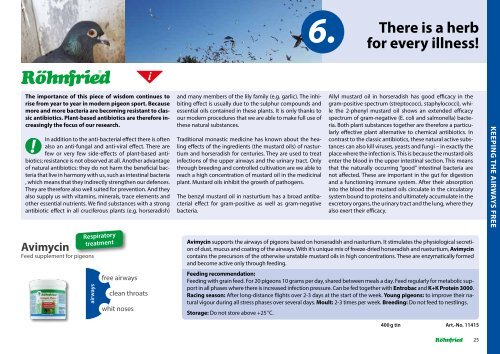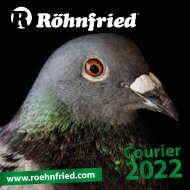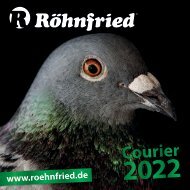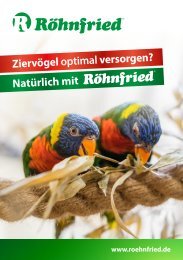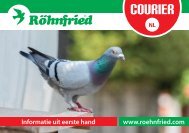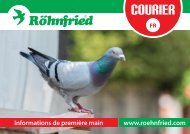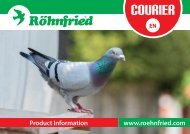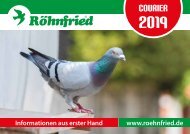Röhnfried Courier 2018 English
Product catalog and information about racing pigeons, breeders and lofts
Product catalog and information about racing pigeons, breeders and lofts
You also want an ePaper? Increase the reach of your titles
YUMPU automatically turns print PDFs into web optimized ePapers that Google loves.
6.<br />
There is a herb<br />
for every illness!<br />
The importance of this piece of wisdom continues to<br />
rise from year to year in modern pigeon sport. Because<br />
more and more bacteria are becoming resistant to classic<br />
antibiotics. Plant-based antibiotics are therefore increasingly<br />
the focus of our research.<br />
!<br />
In addition to the anti-bacterial effect there is often<br />
also an anti-fungal and anti-viral effect. There are<br />
few or very few side-effects of plant-based antibiotics;<br />
resistance is not observed at all. Another advantage<br />
of natural antibiotics: they do not harm the beneficial bacteria<br />
that live in harmony with us, such as intestinal bacteria<br />
, which means that they indirectly strengthen our defences.<br />
They are therefore also well suited for prevention. And they<br />
also supply us with vitamins, minerals, trace elements and<br />
other essential nutrients. We find substances with a strong<br />
antibiotic effect in all cruciferous plants (e.g. horseradish)<br />
Avimycin<br />
Feed supplement for pigeons<br />
Respiratory<br />
treatment<br />
airways<br />
free airways<br />
clean throats<br />
whit noses<br />
and many members of the lily family (e.g. garlic). The inhibiting<br />
effect is usually due to the sulphur compounds and<br />
essential oils contained in these plants. It is only thanks to<br />
our modern procedures that we are able to make full use of<br />
these natural substances.<br />
Traditional monastic medicine has known about the healing<br />
effects of the ingredients (the mustard oils) of nasturtium<br />
and horseradish for centuries. They are used to treat<br />
infections of the upper airways and the urinary tract. Only<br />
through breeding and controlled cultivation are we able to<br />
reach a high concentration of mustard oil in the medicinal<br />
plant. Mustard oils inhibit the growth of pathogens.<br />
The benzyl mustard oil in nasturtium has a broad antibacterial<br />
effect for gram-positive as well as gram-negative<br />
bacteria.<br />
Allyl mustard oil in horseradish has good efficacy in the<br />
gram-positive spectrum (streptococci, staphylococci), while<br />
the 2-phenyl mustard oil shows an extended efficacy<br />
spectrum of gram-negative (E. coli and salmonella) bacteria.<br />
Both plant substances together are therefore a particularly<br />
effective plant alternative to chemical antibiotics. In<br />
contrast to the classic antibiotics, these natural active substances<br />
can also kill viruses, yeasts and fungi – in exactly the<br />
place where the infection is. This is because the mustard oils<br />
enter the blood in the upper intestinal section. This means<br />
that the naturally occurring “good” intestinal bacteria are<br />
not affected. These are important in the gut for digestion<br />
and a functioning immune system. After their absorption<br />
into the blood the mustard oils circulate in the circulatory<br />
system bound to proteins and ultimately accumulate in the<br />
excretory organs, the urinary tract and the lung, where they<br />
also exert their efficacy.<br />
Avimycin supports the airways of pigeons based on horseradish and nasturtium. It stimulates the physiological secretion<br />
of dust, mucus and coating of the airways. With it‘s unique mix of freeze-dried horseradish and nasturtium, Avimycin<br />
contains the precursors of the otherwise unstable mustard oils in high concentrations. These are enzymatically formed<br />
and become active only through feeding.<br />
Feeding recommendation:<br />
Feeding with grain feed. For 20 pigeons 10 grams per day, shared between meals a day. Feed regularly for metabolic support<br />
in all phases where there is increased infection pressure. Can be fed together with Entrobac and K+K Protein 3000.<br />
Racing season: After long-distance flights over 2-3 days at the start of the week. Young pigeons: to improve their natural<br />
vigour during all stress phases over several days. Moult: 2-3 times per week. Breeding: Do not feed to nestlings.<br />
Storage: Do not store above +25 °C.<br />
400 g tin Art.-No. 11415<br />
KEEPING THE AIRWAYS FREE<br />
25


